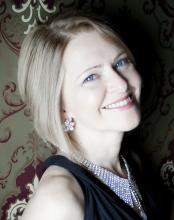David Alexander Rahbee conducts the University Symphony in a program of works by Robert Schumann, Sibelius, and Richard Strauss. Soprano (and UW faculty artist) Cyndia Sieden is featured soloist on Jean Sibelius's tone poem for soprano and orchestra Luonnotar, Op. 70.
PROGRAM DETAILS
Schumann: Symphony in D minor (original 1841 version of Symphony no. 4 in D minor, op. 120)
Jean Sibelius: Luonnotar, Op. 70 (Cyndia Sieden, soprano)
Richard Strauss: Death and Transfiguration, op. 24
ARTIST BIO
Cyndia Sieden, soprano
American soprano Cyndia Sieden moves easily among the Baroque, classical, romantic and contemporary repertoires to worldwide acclaim. In addition, her performances and recordings of his works affirm her status as one of the sovereign Mozart interpreters of the present day.
Highlights of 2011 included performances in Morton Feldman's monodrama Neither for New York City Opera, Ariadne in Wolfgang Rihm's Dionysos at the Netherlands Opera and Soprano I in Luigi Nono's Prometeo at the Salzburg and Berlin Festivals. In contrast to these knotty modern works, she returned to Blondchen in Mozart'sAbduction with Frans Brüggen and the Orchestra of the 18th Century at the Concertgebouw in Amsterdam, and on tour throughout Holland.
Sieden has starred at most of the world's great opera houses, including the Munich Bayerische Staatsoper, the New York Met, Paris's Opéra Bastille, the Wiener Staatsoper, Barcelona's Gran Teatre de Liceu, Brussels's La Monnaie, and London's Covent Garden and English National, as well as in Beijing and Australia. Her highly-praised Metropolitan Opera debut was as Berg's Lulu, and her success quickly led to reengagement in 2008 for Die Zauberflöte's Queen of the Night, one of her signature roles.
She is a brilliantly idiomatic interpreter of the works of Richard Strauss. She frequently performs Zerbinetta in Ariadne auf Naxos (Munich, Japan, Vienna), as well as Sophie in Der Rosenkavalier (Paris Châtelet) and Aminta in Die schweigsame Frau (Palermo and Munich).
Her performances in the high-flying role of Ariel in the premiere of Thomas Adès's The Tempest at the Royal Opera House, Covent Garden, ignited rave reviews and an astonished public. She has garnered equal enthusiasm and devotion for her Queen of the Night in Mozart's Die Zauberflöte and Blondchen in Die Entführung aus dem Serail, all over the world. Other specialties are Cunegonde in Leonard Bernstein's Candide, and the operas of Handel.
Sieden is much in demand for Orff's Carmina Burana, the oratorios and masses of Handel, Mozart, and Haydn, and works of Bach, Strauss and Mahler. She has sung with many of the most renowned symphony orchestras in the world, including the Royal Concertgebouw Orchestra, the Los Angeles Philharmonic, the Cleveland Orchestra, the Atlanta Symphony, the Chicago Symphony Orchestra, the London Symphony Orchestra, and at New York's Mostly Mozart Festival. In addition, her Lieder recitals are always highly-anticipated events.
Cyndia Sieden was born in California, USA, and received her first vocal instruction there. The significant milestone in her studies was work with Elisabeth Schwarzkopf in master classes in Carmel Valley, CA in 1982. Schwarzkopf then invited Sieden to become her private student, and also to work with her in master classes at the 1983 Salzburg Mozarteum. Sieden sang in the culminating concert/competition and won first place, the springboard for her first professional engagements.
In 1984, Cyndia Sieden made her European debut in Il Barbiere at the Bavarian State Opera; her American debut also took place in 1984, in La Fille du Regiment, in Tampa, Florida.
CONDUCTOR BIO
David Alexander Rahbee
David Alexander Rahbee is currently artist in residence at the University of Washington School of Music in Seattle, where he is conductor of the University Orchestra and teaches conducting. He was a recipient of the American-Austrian Foundation's 2003 Herbert von Karajan Fellowship for Young Conductors, the 2005 International Richard-Wagner-Verband Stipend, and received a fellowship from the Acanthes Centre in Paris in 2007.
Dr. Rahbee has appeared in concert with orchestras such as the RTE National Symphony Orchestra of Ireland, Orchestre Philharmonique du Luxembourg, Kammerphilharmonie Berlin-Brandenburg, Orchestre de la Francophonie (Canada), the Dresden Hochschule orchestra, the Boston New Music Initiative, Orquesta Sinfónica de Loja (Ecuador), Armenian Philharmonic Orchestra, Savaria Symphony Orchestra (Hungary), Cool Opera of Norway (members of the Stavanger Symphony), Schönbrunner Schloss Orchester (Vienna), the Whatcom Symphony Orchestra, and the Divertimento Ensemble of Milan. He has collaborated with prominent soloists such as Sarah Chang, David Chan, Joseph Lin. He was an assistant at the Vienna State opera (2002-2010), music director and conductor of the Fidelio Chamber Orchestra in Cambridge, Massachusetts (1997-2001). He has been engaged as a guest rehearsal conductor for numerous young orchestras, such as the New England Conservatory Symphony Orchestra, The Symphony Orchestras of the Hall-Musco Conservatory of Music at Chapman University, and the Vienna University of Technology orchestra, and the Boston Youth Symphony Orchestras (BYSO). Festivals he has been involved with include the Salzburg Festival, the International Bartók Festival, and the Atlantic Music Festival.
Dr. Rahbee's principal conducting teachers were Charles Bruck and Michael Jinbo at the Pierre Monteux School. He holds Bachelor of Music degree in violin and composition from Indiana University, a Master of Music degree from the New England Conservatory in orchestral conducting, and a Doctorate of Musical Arts from the University of Montreal in orchestral conducting. He has also participated in post-graduate conducting classes at the Universität für Musik und Darstellende Kunst, Vienna. Mr. Rahbee has been selected to active participate in masterclasses by renown conductors such as Kurt Masur, Sir Colin Davis, Jorma Panula, Zden?k Mácal, Peter Eötvös, Zoltán Peskó, and Helmut Rilling, and counts Nikolaus Harnoncourt to be among his most influential mentors.
